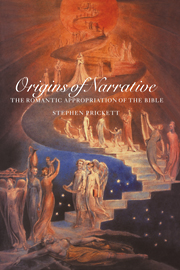Introduction
Published online by Cambridge University Press: 06 November 2009
Summary
‘The history of appropriation’, writes Jonathan Bate in Shakespearean Constitutions, ‘may suggest that “Shakespeare” is not a man who lived from 1564 to 1616 but a body of work that is refashioned by each subsequent age in the image of itself’. If that is true of the Romantic use of Shakespeare, it is doubly so of the Bible, which during the eighteenth century underwent a similar but altogether more profound ‘refashioning’. Though, for obvious reasons, this did not involve the same liberties with the text, an increasing use of the Bible (as against the classics) in almost every form of public and private discourse was accompanied by a largely unnoticed shift in reading and interpretation so radical as to make of it virtually a new book from a hundred years earlier. Even as formal religious observance was by the end of the century declining towards a nadir unequalled at any time since, the prestige of the Bible as a literary and aesthetic model had risen to new heights. Not merely was Romantic thought in England, Germany and even France, steeped through and through in biblical references but, less obviously, Romantic criticism, its accompanying concept of ‘literature’ and even the theory of hermeneutics was no less biblically derived. The Romantic Bible was at once a single narrative work, an on-going tradition of interpretation, and what I have called in these pages a ‘metatype’: a kind of all-embracing literary form that was invoked to encompass and give meaning to all other books.
- Type
- Chapter
- Information
- Origins of NarrativeThe Romantic Appropriation of the Bible, pp. 1 - 8Publisher: Cambridge University PressPrint publication year: 1996



